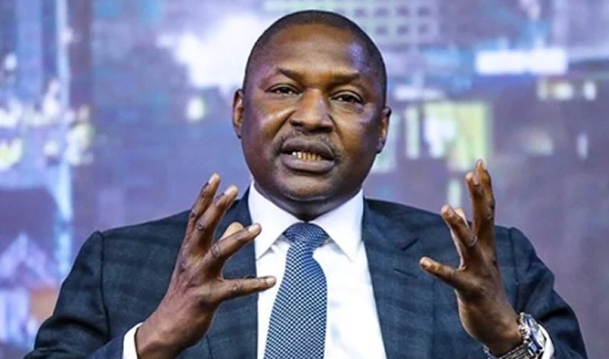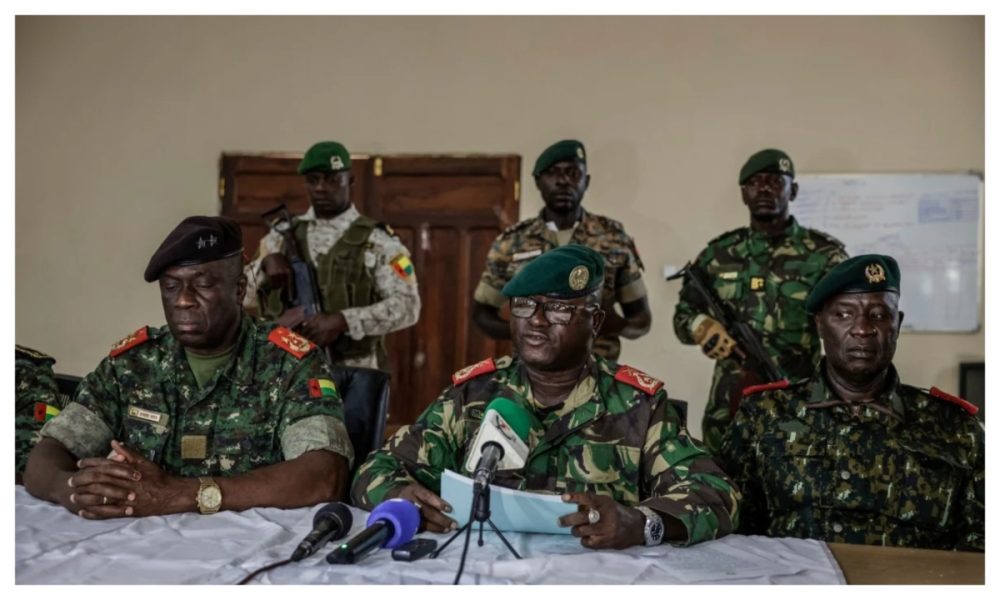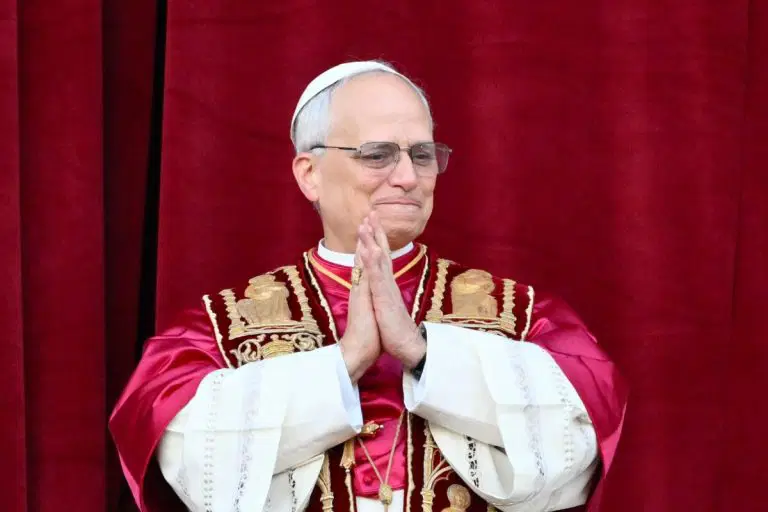Headline
FG Reveals How Nigeria Recovered Loot From UK, Switzerland, US

The Federal Government has given an insight into how preventive measures adopted to check corruption and manage recovered stolen assets had brought about the repatriation of some stolen funds stashed away overseas.
Such funds included the $322.515 million in Switzerland, $311.7 million in the United States, €5.4 million Euros in Northern Ireland, €4,214,017.66 in the United Kingdom and another $200 million.
The Attorney General of the Federation and Minister of Justice, Abubakar Malami, according to a statement issued on Tuesday by his Special Assistant (Media and Public Relations), Dr. Umar Gwandu, stated these during the 2021 annual public lecture in New York organised by the Centre for Media and Peace Initiative, New York, United States of America, Monday.
According to him, being an Africa Union Champion in the fight against corruption, the President, Major General Muhammadu Buhari (retd.), has endeavoured under his regime to fight corruption in all its ramifications through legislative framework.
READ ALSO: Inflation Threatening Prompt Judgement Delivery In Nigeria, NJC Laments
He said that outstanding successes recorded by the regime in international asset recovery could be a template for other African countries in the fight against graft.
Malami said, “Various steps have been taken in terms of legislative frameworks, establishment of institutions and policy measures targeted at combatting corruption, regional cooperation and ensuring good governance for the benefit of citizens.
“In 2017, the signing of a trilateral agreement with Switzerland and the World Bank enabled the recovery of $322.515 million.
“In 2020, a total sum of $311.7 million was returned to Nigeria after signing another trilateral agreement with the U.S.A and Bailiwick of Jersey.
“Also in the year 2020, 5.4 million Euros was recovered in March emanating from an agreement signed with Northern Island.
“The Federal Government was able to recover from the UK the sum of €4,214,017.66 connected to the family of James Ibori.
“Additional recoveries to the tune of $200 million are being anticipated subject to the settlement of litigation of which the Ministry of Justice is attending to presently.”
Malami said the present regime was able to achieve the successes due to political will, funding, legislation, institutional support, and Executive Orders by President Buhari.
“The Buhari’s approach to fight against corruption has been one of three cardinal pillars of our campaign promises, the others are economic and security development”, the minister said.
He stressed that Nigeria had taken anti-corruption measures in tackling cybercrime, money laundering, oil bunkering and false assets declaration among others.
The AGF said that the Federal Government had developed the National Anti-Corruption Strategy and guidelines for smooth implementation of the strategy which has five pillars of prevention of corruption, public engagement, ethical re-orientation, enforcement and sanction, and recovery and management of proceeds of crime.
“I am pleased to inform this gathering that the Federal Government of Nigeria has recovered funds from corporate bodies and individuals through the combined efforts of the Office of the Attorney-General of the Federation and Minister of Justice and our law enforcement agencies through local and international collaboration with international community and adoption of strategies put in place”, he said.
The minister said that former state governors, senators and ministers including some members of the ruling All Progressives Congress were not spared in the fight against corruption.
“Currently, high profile personalities including judicial officers and former governors indicted for corruption have been or are being prosecuted. We have some former top government officials convicted and serving various jailterms for corruption-related crimes while in office”, he said.
While arguing that the stance of Nigeria in the anti-corruption struggle has been adjudged to be recording tremendous success, Malami said that the position was upheld by credible International organisations including the United Nations Office of Drugs and Crimes.
The minister said the consequential effects of the approach of the Buhari regime in the fight against corruption was reflective in the UNODC 2019 corruption survey report titled: “Corruption in Nigeria: Patterns and trends.”
READ ALSO: IMF To CBN: Watch e-Naira Risks
He said the report alluded to a decrease in bribery which was the bedrock of corruption and also established Nigeria’s leadership in the fight against corruption.
The statement also quoted the 2019 UNODC report that “the efforts made to prevent and counter corruption in its various manifestations have earned Mr. President the role of the African Union’s anti-corruption champion. This survey is yet another example of Nigeria’s leadership in the fight against corruption and is testimony to the seriousness of purpose of the government’s anti-corruption agenda.”
Malami therefore called on Africans in both public and private sectors to aspire from the inspiration and understand that integrity pays above acquiring illegal monies from corrupt practices.
“I hereby reiterate Nigeria’s call for a strong institutionalised body that could join forces together with African countries to fight corruption. Collaboration in support for institutions, development of international and regional strategies and guidelines will go a long way in addressing the menace of corruption”, he said.
(PUNCH)
Headline
Coup: Guinea-Bissau Junta Releases Six Held Opposition Politicians

Guinea-Bissau’s ruling junta on Tuesday released six members of the political opposition who had been detained since a coup last month.
The six freed opposition members are said to be close associates of Domingos Simoes Pereira, head of the PAIGC party that led the country to independence in 1974.
Pereira has been in custody since the coup.
In a statement by the High Military Command, the junta’s governing body, the releases are described as a sign of good faith and a step towards the return to constitutional normality and respect for international rights.
READ ALSO:Why West African Troops Overturned Benin’s Coup But Watched Others Pass
The army seized power on 26 November after ousting outgoing President Umaro Sissoco Embalo in the wake of a presidential vote.
After taking over, the military suspended the electoral process and announced it would take control of the West African country for a period of one year.
Recall that another opposition candidate, Fernando Dias, took refuge in Nigeria’s embassy, which granted him asylum, while Embalo fled the country after being briefly detained by the military at the time of the coup.
Meanwhile, Senegal’s Foreign Minister, Cheikh Niang, led a delegation to Guinea-Bissau, where he met with detained opponents and requested their release.
Headline
7 Territories Still Under Colonial Rule

Even though most nations became independent in the last century, some territories are still ruled by other nations.
Contents
1. Western Sahara
2. Guam
3. American Samoa
4. United States Virgin Islands
5. Falkland Islands / Malvinas
6. Gibraltar
7. Bermuda
Many of them remain on the United Nations list of non-self-governing territories, meaning they have not completed the process of decolonization. These places usually depend on bigger countries for laws, passports, defence, or political control.
In this article, Nigerian Tribune highlights 7 territories still under colonial rule:
READ ALSO:Nigeria Ranks World’s 102nd Happiest Nation, US, Germany Not Among 20 Top Counties
1. Western Sahara
Western Sahara remains one of the world’s biggest unresolved colonial issues. Morocco controls most of the territory, but the Polisario Front wants independence for the Sahrawi people. The UN is still trying to help both sides agree on a peaceful solution.
2. Guam
Guam is an important US territory in the Pacific, used heavily for American military operations. The US oversees its defence and foreign relations.
People living there are US citizens, but they cannot vote in presidential elections and do not have full representation in Congress.
READ ALSO:FULL LIST: US To Review Green Cards From 19 ‘Countries Of Concern’ After Washington Shooting
3. American Samoa
American Samoa has more local control than Guam, but the United States still decides immigration, defence, and foreign affairs.
Residents are considered US nationals and must apply if they want full citizenship.
4. United States Virgin Islands
The US Virgin Islands have their own legislature, but the United States makes major constitutional and political decisions. The territory depends heavily on US federal support.
5. Falkland Islands / Malvinas
The Falkland Islands remain controlled by the United Kingdom (UK), but Argentina has long disputed this claim, having been in control of the Islands for a few years before 1833.
The people living there voted strongly to stay British, yet the sovereignty dispute continues to appear in the UN.
READ ALSO:Six Countries With Highest Number Of Billionaires In 2025
6. Gibraltar
Gibraltar sits at the Southern tip of Spain. The United Kingdom controls it, but Spain insists the territory belongs to them.
Gibraltarians have repeatedly voted in favour of remaining British, but the dispute is still discussed within the UN Decolonisation Committee.
7. Bermuda
Bermuda is a British Overseas Territory situated in the North Atlantic Ocean. Although it manages most of its own internal affairs and enjoys a strong economy with modern facilities, the United Kingdom still handles its defence and represents it in global matters.
Headline
Russia-Ukraine War: Pope Leo Calls For Global Christmas Truce

Pope Leo XIV on Tuesday renewed his call for a global truce on Christmas Day, saying he felt “great sadness” after Russia “apparently rejected a request” for a pause in fighting.
Speaking to reporters at his residence in Castel Gandolfo near Rome, the Pope urged all sides involved in conflict to observe at least one day of peace.
“I am renewing my request to all people of goodwill to respect a day of peace — at least on the feast of the birth of our Saviour,” Leo said.
Recall that Russia invaded Ukraine in February 2022 and has repeatedly turned down calls for a ceasefire, arguing that any pause would give Ukraine a military advantage.
READ ALSO:Russian Strikes Kill Five In Ukraine, Cause Power Outages
“Among the things that cause me great sadness is the fact that Russia has apparently rejected a request for a truce,” the pope said.
Referring to conflicts worldwide, Leo added, “I hope they will listen and there will be 24 hours of peace in the whole world.”
The appeal came as fighting continued in eastern Ukraine. On Tuesday, Ukrainian forces withdrew from a town after heavy battles with Russian troops. Russian strikes killed three civilians and left thousands without power during winter temperatures.
READ ALSO:Trump Blasts Ukraine For ‘Zero Gratitude’ Amid Talks To Halt War
There was no indication of progress toward ending the war after separate meetings last weekend in Miami between the United States officials and negotiators from Russia and Ukraine. The conflict is nearing four years with no settlement in sight.
Earlier this month, Pope Leo met Ukrainian President Volodymyr Zelensky. When asked whether he would accept Zelensky’s invitation to visit Ukraine, the pope said, “I hope so,” while noting that it was not possible to say when such a visit could happen.
Leo also warned that efforts to secure peace without European diplomatic involvement were “unrealistic”, expressing optimism that President Donald Trump’s proposed peace plan could bring a “huge change” to the transatlantic alliance.

 News2 days ago
News2 days agoPHOTOS: New Era In Furupagha-Ebijaw As Okpururu 1 Receives Staff Of Office

 Metro5 days ago
Metro5 days agoJUST IN: Former Edo Information Commissioner Is Dead

 News2 days ago
News2 days agoUBTH CMD Marks 120 Days In Office, Expresses Commitment To Providing Conducive Working Environment

 News2 days ago
News2 days agoFG Declares Public Holidays For Christmas, New Year Celebrations

 News5 days ago
News5 days agoCoordinator, Edo First Lady Office, Majority Leader, Rights Lawyer, Others Bag 2025 Leadership Award

 Metro5 days ago
Metro5 days agoShe Grabs, Pulls My Manhood Anytime We Fight — Husband

 News2 days ago
News2 days agoOPINION: Gumi And His Terrorists

 News2 days ago
News2 days agoFIRS Confirms NIN As Tax ID

 Metro5 days ago
Metro5 days agoWhy I Charged My Husband Money For Sex —Woman

 News2 days ago
News2 days agoOPINION: My Man Of The Season
































